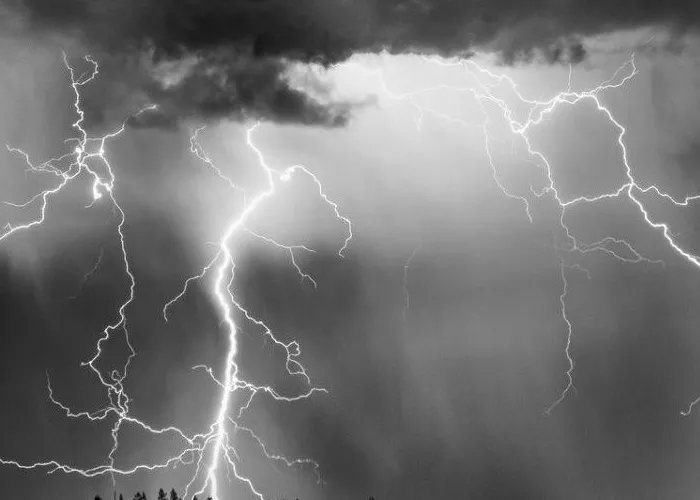Welcome to Poem of the Day – You Will Hear Thunder by Anna Akhmatova.
Akhmatova lived through tumultuous periods in Russian history, including the Revolution and World War I. These experiences infused her poetry with a sense of struggle and defiance. In You Will Hear Thunder, she channels these emotions, crafting a work that resonates with themes of forewarning, endurance, and inevitable change. This poem exemplifies her ability to express complex feelings in a manner that feels both personal and universal.
You Will Hear Thunder Poem
You will hear thunder and remember me,
And think: she wanted storms. The rim
Of the sky will be the colour of hard crimson,
And your heart, as it was then, will be on fire.
That day in Moscow, it will all come true,
when, for the last time, I take my leave,
And hasten to the heights that I have longed for,
Leaving my shadow still to be with you.
You Will Hear Thunder Poem Explanation
Anna Akhmatova’s You Will Hear Thunder is a profound reflection of inner turmoil, longing, and resilience. The poem encapsulates Akhmatova’s characteristic themes: personal suffering and the larger, universal struggles faced during times of adversity. Written with her signature lyrical precision, the poem subtly intertwines personal emotion with powerful natural imagery. The title itself hints at an impending storm, suggesting a metaphorical upheaval that echoes through the verses.
Structure and Form
You Will Hear Thunder is characterized by its free verse structure, which Akhmatova often employed to allow greater freedom of expression. This poem does not adhere to a strict meter or rhyme scheme, reinforcing the unpredictability and raw emotion embedded in the content. The lack of rigid structure mirrors the chaos suggested by the storm imagery, emphasizing the themes of nature’s uncontrollable power and the poet’s tumultuous inner state.
Akhmatova uses vivid imagery and subtle metaphors to convey her message. The free verse enables her to emphasize key phrases and shift the focus as the poem unfolds, creating a rhythm that aligns with the natural cadences of speech and thought.
Detailed Explanation of Major Elements
1. Imagery and Symbolism
The poem’s central imagery is that of a storm, represented by thunder. Thunder in literature often symbolizes an approaching crisis or a significant shift. Akhmatova’s use of this imagery is both literal and symbolic, reflecting a moment of forewarning and emotional upheaval. The storm symbolizes the poet’s struggles with both external forces and her inner battles, suggesting that turbulent change is imminent.
Another significant symbol is the rain. Rain can signify cleansing, renewal, or sorrow. In Akhmatova’s context, it serves as a dual symbol—indicating both the hardship faced and the hope for eventual relief or catharsis.
2. Tone and Mood
The tone of You Will Hear Thunder is intense and foreboding. It captures the speaker’s anticipation of an unavoidable event, laced with both dread and resolve. The mood is one of anxious waiting, colored by the expectation of something powerful that cannot be controlled. This mixture of fear and anticipation permeates the poem, creating an emotional landscape that mirrors the coming storm.
3. Themes of Resilience and Transformation
Akhmatova’s work frequently touches on themes of resilience amid suffering, and this poem is no exception. The poem acknowledges the storm’s power but does not cede to it. Instead, it hints at an inner strength that meets adversity head-on. The storm represents not just external chaos, but an inner transformation—an acceptance that change, no matter how overwhelming, is a part of life’s cycle.
The final stanzas often suggest that after the storm passes, renewal or a new beginning is possible. Akhmatova’s nuanced use of this theme emphasizes that while turmoil may disrupt, it also leads to growth and clarity.
4. Metaphorical Language
The poem is rich in metaphors that convey deeper meaning. Phrases that describe thunder, lightning, and the sky’s tumultuous state are not just depictions of weather but metaphors for the speaker’s emotional state. Akhmatova’s choice of words encapsulates both the violent nature of the storm and the inner voice of resilience that seeks to endure it.
5. Historical and Personal Context
Understanding Akhmatova’s background enhances the interpretation of You Will Hear Thunder. Living through the Soviet era, she witnessed the suppression of art, personal loss, and the sufferings of an entire nation. This context adds depth to the poem, transforming it into a subtle defiance against repression and an ode to survival in the face of overwhelming odds.
Conclusion
You Will Hear Thunder by Anna Akhmatova is a compelling blend of personal reflection and universal resonance. Through its vivid imagery, metaphorical language, and free-verse form, it encapsulates the inevitability of change and the enduring spirit required to face it. Akhmatova’s poem remains a timeless reminder of the strength found in the heart of life’s storms.

